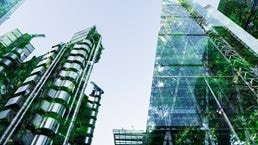McKinsey talked to Eric Francia, president and CEO of ACEN, the listed energy platform of the Ayala Group. The company has ~4,000 MW of attributable capacity in the Philippines, Vietnam, Indonesia, India, and Australia, and aspires to be the largest listed renewables platform in Southeast Asia.
McKinsey: Can you share with us your journey as president and CEO of ACEN?
Eric Francia: I joined Ayala as head of corporate strategy in 2009, coming from a management consulting background albeit with zero knowledge about power. At that time, Ayala’s investors wanted to know what the next big thing for Ayala was. Given the Philippines’ strong growth trajectory but limited infrastructure investments, my team recommended that Ayala enter the energy and infrastructure sectors. The board and senior leadership were very supportive of the strategy, and I thought that my job was done. I was dead wrong. To my surprise, I was tasked to lead the execution and build the business; it was daunting yet exciting. We started ACEN in 2011, (known as AC Energy then) from a standing start at zero megawatts and with a big dream of becoming a meaningful player in power in the Philippines. We initially targeted to reach 1,000 megawatts of capacity in the first five years, which we had achieved. While we initially wanted to focus on clean energy, we quickly recognized back then that what the country needed was reliable and low-cost power, which could be best provided by thermal coal power. Unfortunately, renewable energy was not competitively priced and not reliable at the time. As a result, by 2016, more than 90 percent of our capacity was from coal plants.
2016-17 was a pivotal moment for ACEN when we did a strategic transformation on three dimensions. Firstly, we expanded beyond the Philippines and started growing across the Asia Pacific region. We expanded our footprint to Indonesia, Vietnam, India, and Australia.
Secondly, we shifted our focus from thermal to renewables. While it was still early days, we saw there was strong demand for ESG oriented investments, and renewables were getting increasingly more competitive. We started divesting our coal plants and reinvesting the proceeds to aggressively expand our renewable investments.
Thirdly, from being an investment management-oriented company dependent on development and industrial partners (given our lack of experience in the sector), we decided to build our capabilities in development and operations. We did so by acquiring some of our trusted partners, integrating them into ACEN, and growing our capabilities organically.
From a renewable capacity of 80 megawatts in 2016, we grew over 40-fold to 3500 megawatts of attributable renewables capacity today.
We have committed to Net Zero GHG emissions by 2050, and also committed to becoming a 100 percent renewable company by 2025. We aspire to be the largest renewables platform in Southeast Asia. We recently announced our audacious goal for 2030. ACEN 2030 is our vision to reach 20 gigawatts of renewables by 2030. This represents a 6x growth and a 25 percent CAGR from where we are today. While this is quite a challenging goal, I believe that we’ve got what it takes to get there.
McKinsey: What factors have given ACEN the insight and vision to pursue such an aspiration—and what can other corporates learn from this?
Eric Francia: Like us, you need to believe that the energy transition is real. It’s a multi-decade phenomenon and it’s not going to happen overnight. Europe is the leader and pioneer in the renewable energy movement, and America is also doing its part. The Asia Pacific region will have to catch up.
I believe that the renewables market will experience a 20 plus percent compounded annual growth rate for multiple decades, given the large gigawatts of fossil fuel technology that need to be replaced over time. In this emerging and growing region, just imagine how many renewable gigawatts will need to be built—it is a massive requirement, and this gives us the audacity to be aspirational about our goals.
In the light of the Ukraine crisis, the other important context that we’re facing today is economic volatility and elevated prices. The silver lining is that this accelerates the inevitable, which is the energy transition. It accelerates the pace at which renewables and storage become more competitive and scalable.
This isn’t only about economics, but also about energy security. These geopolitical issues expose the risks of energy dependence. Indigenous energy, of which renewables are the best form, is critical for long-term sustainable energy, security, and reliability.

Shapers of Sustainability
McKinsey: What are the top challenges that players in this region face in their transition to net zero?
Eric Francia: The first challenge is the policy and regulatory environment. It depends on the particular jurisdiction or country. In more centralized market structures like Vietnam or Indonesia, industry is heavily reliant on government policy. Policy can be as simple as procurement of renewables. But we’re all reliant on a single off-taker, typically the government. This is crucial in, for example, Indonesia, where government is committed to net zero by 2060, but the industry is still waiting for specific policies.
Government should encourage the scale-up of renewables. In the Philippines, there is the renewable portfolio standard, which is a market-making mechanism to encourage the industry to purchase a certain amount of renewables. One of the challenges in scaling up renewables is the intermittent nature of the technology. What do you do when the sun doesn’t shine or the wind doesn’t blow? The holy grail of unlocking the full potential of renewables is to scale up battery storage and to make renewables dispatchable and reliable.
Another challenge is transmission. This applies to every market we operate in. Transmission often is a bottleneck when rolling out renewables, exacerbated by the fact that renewables are intermittent and storage is not viable for ‘time shifting’ at the moment. So I think upgrading and future-proofing transmission capacities and the grid infrastructure is quite critical to accelerate the scale-up of renewables.
McKinsey: How can private financial institutions unlock capital and help accelerate the transition? What role can private financial institutions play?
Eric Francia: It is a critical role, and that of an enabler. There is massive capital available globally, but there is a limitation in terms of the investment outlets where they are deployed—which is an opportunity for us, being one of the largest issuers of green bonds in Southeast Asia and the largest in the Philippines. We have issued $1.8 billion worth of green bonds just in the last three years, which has fueled the expansion of companies like us in terms of aggressive investments in renewables.
In the Philippines, the two largest sectors the banks lend to are real estate and power. But many banks are now saying no to lending to coal, so they need to replace that—and they’re looking at companies like us to accelerate their renewable investments. We have the confidence to be bold and aggressive with our goals because we know that there’s going to be capital backing these investments.
McKinsey: Where can blended finance play a catalytic role in making the risk-return profile more attractive and accelerating the transition to net zero?
Eric Francia: There are two categories of investments that blended finance can enable. One is in the area of new technologies. We had, for example, grants on investments in new technologies such as battery storage in Vietnam, and in Australia. We are also talking to another overseas developer to help fund a floating solar project.
The other opportunity is in the so-called energy-transition mechanism (ETM). The concept of the ETM is that there are purpose-driven investors who will purchase coal plants, with the intent of retiring them early and transitioning them to cleaner technology. We were one of the early movers: ACEN successfully employed the ETM approach with our 246-megawatt coal plant. We committed to retire the coal plant by 2040, which is fifteen years ahead of its technical life. In this energy transition, we should proactively think about decommissioning and retiring large coal plants and later on, even gas plants. You need to be planning far ahead; in our particular case we’re planning eighteen years ahead.
McKinsey: What excites you the most about ACEN in your journey to net zero?
Eric Francia: The Ayala group focuses on megatrends of digitalization and decarbonization, with ACEN at the core of its decarbonization efforts. The world is geared towards net zero, and it’s so encouraging for us to be playing a direct role in this vital journey. It keeps us motivated and allows us to attract talent. A lot of the young managers these days have a deep sense of purpose and commitment to sustainability and net zero. We’re delighted to be at the forefront of this movement and create lasting impact.
This interview is part of an ongoing series on Shapers of Sustainability, where we convene leaders on sustainability to discuss challenges and opportunities in the Asia-Pacific region’s transition to net-zero.

